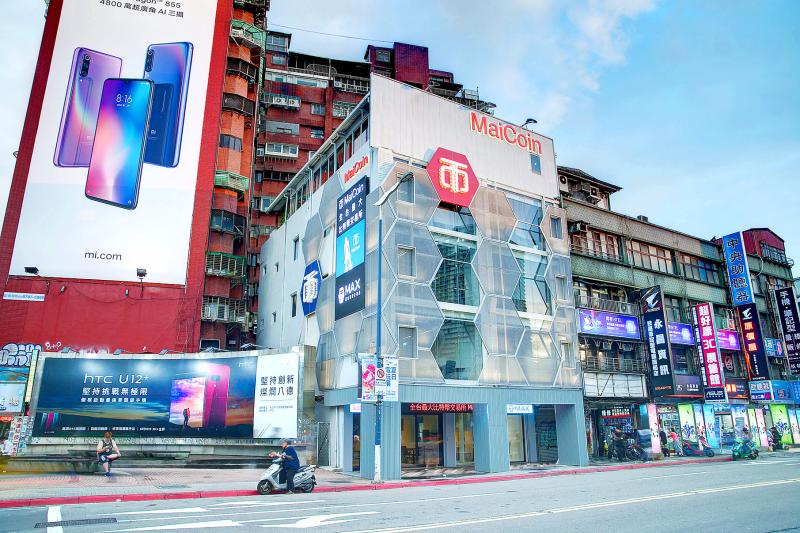Cryptocurrency exchange MaiCoin Ltd (現代財富科技) has submitted an anti-money laundering compliance statement to the Financial Supervisory Commission after the regulator last week required all eight cryptocurrency trading platforms in Taiwan to submit compliance statements by the end of next month.
MaiCoin is the first local exchange to have sent the compliance document to the commission. Other exchanges must file before the deadline or face a fine of between NT$500,000 and NT$10 million (US$17,943 and US$358,860), the commission said yesterday.
The government has imposed specific regulations on local cryptocurrency exchanges to prevent them from being used by money launderers, signaling that the government has attached more importance to the cryptocurrency business, MaiCoin CEO Alex Liu (劉世偉) said in a statement yesterday.

Photo courtesy of MaiCoin Ltd
A healthy ecosystem of cryptocurrency would allow exchanges to provide diverse and innovative services for consumers and to create a safe, convenient trading environment, Liu said.
MaiCoin, Taiwan’s largest cryptocurrency exchange, said the number of registered accounts had surpassed 650,000 as of the end of last month, accounting for more than 60 percent of combined accounts of all cryptocurrency exchanges.
The company has since 2018 operated a division that focuses on risk control and money laundering activities. The division also helps communicate with authorities and inspects the exchange’s internal controls against money laundering, together with Deloitte & Touche Taiwan (勤業眾信聯合會計師事務所) and PricewaterhouseCoopers (PwC) Taiwan (資誠聯合會計師事務所), it said.
The demand for compliance documents represents the commission’s latest effort to regulate cryptocurrency businesses after the regulator on July 1 imposed new anti-money laundering regulations that require trading platforms to report transactions valued at more than NT$500,000.
Some cryptocurrency exchanges have reportedly decided to halt their operations due to the new regulations and would not file compliance statements to the commission, the Chinese-language Commercial Times reported.

Among the rows of vibrators, rubber torsos and leather harnesses at a Chinese sex toys exhibition in Shanghai this weekend, the beginnings of an artificial intelligence (AI)-driven shift in the industry quietly pulsed. China manufactures about 70 percent of the world’s sex toys, most of it the “hardware” on display at the fair — whether that be technicolor tentacled dildos or hyper-realistic personalized silicone dolls. Yet smart toys have been rising in popularity for some time. Many major European and US brands already offer tech-enhanced products that can enable long-distance love, monitor well-being and even bring people one step closer to

Malaysia’s leader yesterday announced plans to build a massive semiconductor design park, aiming to boost the Southeast Asian nation’s role in the global chip industry. A prominent player in the semiconductor industry for decades, Malaysia accounts for an estimated 13 percent of global back-end manufacturing, according to German tech giant Bosch. Now it wants to go beyond production and emerge as a chip design powerhouse too, Malaysian Prime Minister Anwar Ibrahim said. “I am pleased to announce the largest IC (integrated circuit) Design Park in Southeast Asia, that will house world-class anchor tenants and collaborate with global companies such as Arm [Holdings PLC],”

TRANSFORMATION: Taiwan is now home to the largest Google hardware research and development center outside of the US, thanks to the nation’s economic policies President Tsai Ing-wen (蔡英文) yesterday attended an event marking the opening of Google’s second hardware research and development (R&D) office in Taiwan, which was held at New Taipei City’s Banciao District (板橋). This signals Taiwan’s transformation into the world’s largest Google hardware research and development center outside of the US, validating the nation’s economic policy in the past eight years, she said. The “five plus two” innovative industries policy, “six core strategic industries” initiative and infrastructure projects have grown the national industry and established resilient supply chains that withstood the COVID-19 pandemic, Tsai said. Taiwan has improved investment conditions of the domestic economy

Sales in the retail, and food and beverage sectors last month continued to rise, increasing 0.7 percent and 13.6 percent respectively from a year earlier, setting record highs for the month of March, the Ministry of Economic Affairs said yesterday. Sales in the wholesale sector also grew last month by 4.6 annually, mainly due to the business opportunities for emerging applications related to artificial intelligence (AI) and high-performance computing technologies, the ministry said in a report. The ministry forecast that retail, and food and beverage sales this month would retain their growth momentum as the former would benefit from Tomb Sweeping Day